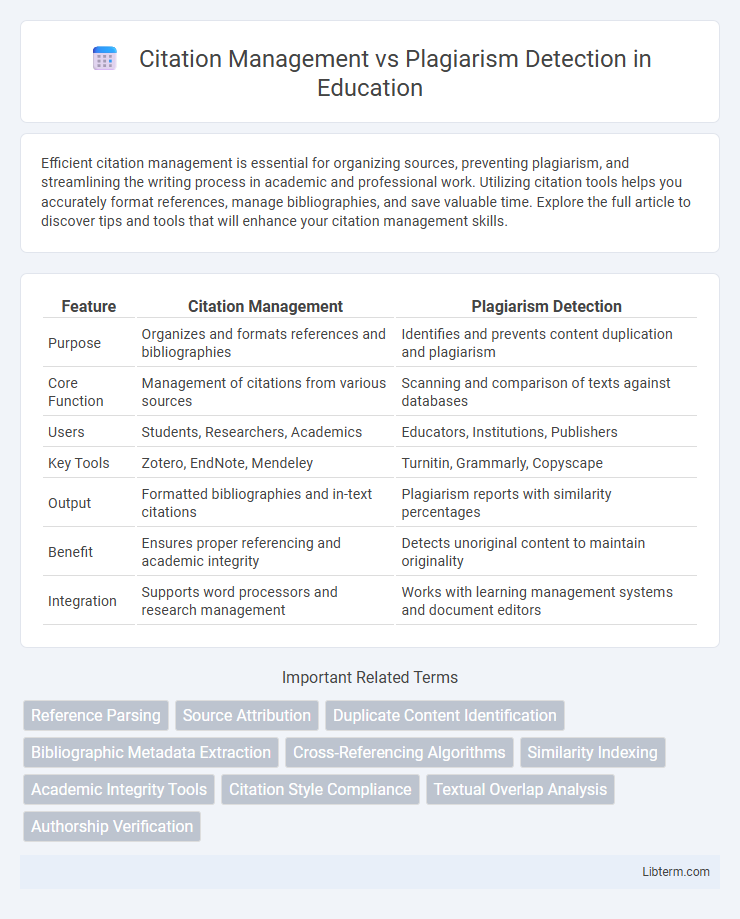Efficient citation management is essential for organizing sources, preventing plagiarism, and streamlining the writing process in academic and professional work. Utilizing citation tools helps you accurately format references, manage bibliographies, and save valuable time. Explore the full article to discover tips and tools that will enhance your citation management skills.
Table of Comparison
| Feature | Citation Management | Plagiarism Detection |
|---|---|---|
| Purpose | Organizes and formats references and bibliographies | Identifies and prevents content duplication and plagiarism |
| Core Function | Management of citations from various sources | Scanning and comparison of texts against databases |
| Users | Students, Researchers, Academics | Educators, Institutions, Publishers |
| Key Tools | Zotero, EndNote, Mendeley | Turnitin, Grammarly, Copyscape |
| Output | Formatted bibliographies and in-text citations | Plagiarism reports with similarity percentages |
| Benefit | Ensures proper referencing and academic integrity | Detects unoriginal content to maintain originality |
| Integration | Supports word processors and research management | Works with learning management systems and document editors |
Understanding Citation Management
Citation management involves organizing and formatting references to ensure proper acknowledgment of sources, which is essential in maintaining academic integrity and avoiding plagiarism. Tools like EndNote, Zotero, and Mendeley streamline the process by allowing users to collect, store, and generate citations in various styles such as APA, MLA, or Chicago. Effective citation management enhances research efficiency and ensures compliance with scholarly standards.
What Is Plagiarism Detection?
Plagiarism detection involves identifying instances where text or ideas have been copied or closely paraphrased without proper attribution, using specialized software that compares submitted content against extensive databases and online sources. This process helps maintain academic integrity by ensuring originality and preventing intellectual property violations. Unlike citation management, which organizes references and sources, plagiarism detection specifically targets uncredited content to uphold ethical standards in writing and research.
Key Differences Between Citation Management and Plagiarism Detection
Citation management involves organizing, storing, and formatting references to ensure accurate source attribution, while plagiarism detection identifies unoriginal content by comparing text against external databases to prevent intellectual theft. Citation management tools, such as EndNote and Zotero, streamline referencing processes, whereas plagiarism detection platforms like Turnitin and Grammarly scan for copied material. The core difference lies in citation management supporting proper attribution for scholarly writing, and plagiarism detection safeguarding content originality.
Why Citation Management Matters in Academic Writing
Citation management streamlines the organization and accurate referencing of sources, ensuring proper credit to original authors and maintaining academic integrity. Effective citation tools prevent unintentional plagiarism by providing consistent, correctly formatted citations that support the credibility of scholarly work. Mastery of citation management is essential for researchers to validate their arguments and uphold the standards of academic writing.
The Importance of Plagiarism Detection Tools
Plagiarism detection tools are essential for maintaining academic integrity by identifying unoriginal content and ensuring proper attribution. These tools analyze documents against extensive databases, improving the accuracy of originality verification. Effective plagiarism detection safeguards intellectual property and upholds the credibility of research and academic work.
How Citation Managers Prevent Unintentional Plagiarism
Citation management tools streamline the organization and formatting of sources, ensuring accurate attribution and reducing the risk of unintentional plagiarism. By automatically generating citations and bibliographies in various styles such as APA, MLA, and Chicago, these tools help writers maintain proper credit for original ideas. Integration with word processors allows seamless insertion of references, minimizing errors and promoting academic integrity throughout the writing process.
Popular Citation Management Software Comparison
Popular citation management software like EndNote, Zotero, and Mendeley streamline the organization and formatting of academic references, enhancing research efficiency. EndNote excels in integration with Microsoft Word and offers extensive citation styles, while Zotero provides open-source flexibility and strong web browser compatibility. Mendeley combines reference management with social networking features, allowing researchers to collaborate and share resources seamlessly.
Leading Plagiarism Detection Tools Overview
Leading plagiarism detection tools such as Turnitin, Grammarly, and Copyscape integrate citation management features to ensure proper source attribution while identifying unoriginal content. These platforms use advanced algorithms to compare submitted texts against vast databases and online resources, effectively detecting plagiarism and improper citations. Efficient citation management within these tools helps maintain academic integrity by guiding users to correctly reference sources, reducing the risk of accidental plagiarism.
Integrating Citation Management with Plagiarism Detection
Integrating citation management with plagiarism detection enhances academic integrity by ensuring all sources are properly attributed while scanning for unoriginal content. Tools combining citation databases with plagiarism algorithms streamline the writing process, reducing errors in both referencing and originality checking. This integration supports researchers and students in maintaining comprehensive, accurate citations alongside thorough plagiarism analysis for credible, ethical scholarship.
Best Practices for Academic Integrity
Effective citation management tools help scholars organize sources and generate accurate references, reducing unintentional plagiarism in academic writing. Plagiarism detection software identifies potential overlaps with existing works, guiding students and researchers to properly attribute ideas and maintain originality. Combining thorough citation practices with reliable plagiarism checks fosters academic integrity, ensuring respect for intellectual property and credible scholarship.
Citation Management Infographic

 libterm.com
libterm.com